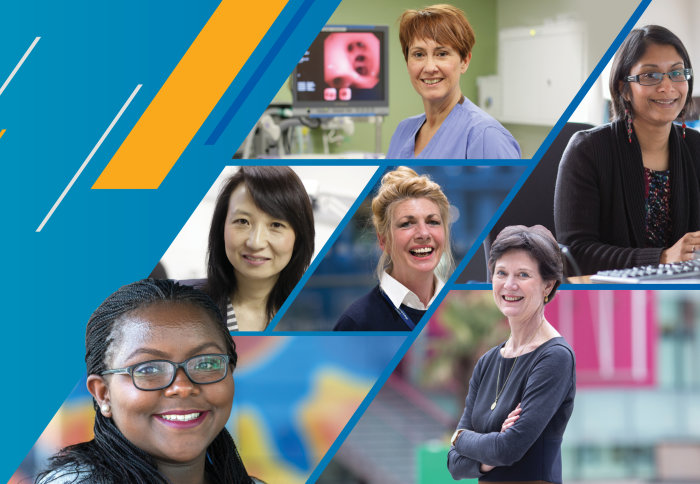Women@Imperial Week celebrates achievements of women across the College

Imperial celebrated the achievements of its female staff and students with a range of events for Women@Imperial Week, including its first Wikithon.
Women@Imperial is an annual event that takes place around International Women’s Day to celebrate female staff, students and alumni and to raise awareness of the initiatives that the College has in place to support women.
Our aim is to challenge the typical stereotypes of what a scientist looks like but also to provide role models for the next generation of scientists Dr Nathalie Pettorelli Senior research fellow, Zoological Society of London
The programme for the week included a networking skills workshop, a free screening of the award-winning film Hidden Figures and an event organised by the student-led Machine Learning Society to highlight the work of three women pushing the boundaries of technology. Alongside these, a photographic exhibition ran throughout the week in the College main entrance.
Visitors of the exhibition were asked to share their experiences of being a woman at Imperial and write about what they would do if they were President for a day on two suggestion boards set up next to the exhibition panels. The comments received are being reviewed by the Assistant Provost for Equality, Diversity and Inclusion who will provide a summary and response. Various departments at the College also took to social media to share stories of their female staff and students with the hashtag #ImperialWomen.
Events either side of the week included a public talk by Eva Kaufholz from the University of Hamburg on how appearance has shaped perceptions of female mathematicians, and a talk by Professor Londa Schiebinger from Stanford University about gendered innovations in science, medicine and engineering.
Professor Stephen Curry, Imperial’s Assistant Provost for Equality, Diversity and Inclusion, said: “Women@Imperial Week is important because we know that as an institution we still have work to do to ensure that Imperial is a place where all women feel that equality of respect and opportunity is a daily reality.
For many it is, and that’s why it is important to celebrate the achievements and positive experiences of female staff and students at Imperial, while taking stock of the challenges that we still face.”
Women in STEM Wikithon
Staff and students gathered to create and update existing Wikipedia entries for key female figures in Imperial’s history and beyond at a Women in STEM Wikithon. Currently, only one in six of Wikipedia’s 1.5 million biographies are of women. A 2011 survey conducted by the Wikimedia Foundation, which runs Wikipedia, found that only nine per cent of Wikipedia editors are women.
Web editor and Wikimedian Alice White from the Wellcome Trust provided training for anyone new to editing Wikipedia. During the session several new entries were created or edited for notable women in STEM, such as electrical engineer Margaret Partridge, whose profile was edited by Anne Locker of The Institution of Engineering and Technology.
Anne Barrett, who organised the Wikithon, said: “Having researched and written a book about women at Imperial College London, it had become clear to me that more needed to be done to improve the integrity of online material, but also to include more women in STEM. A Wikithon seemed the best way to do this.
“We will be repeating the Wikithon in the 2019 Women@Imperial Week – there is still a long way to go to catch up with women’s lives being out there.”
Anne is College Archivist & Corporate Records Manager at Imperial, and the author of a book entitled Women at Imperial College Past, Present and Future, which documents the inspirational role women have played in the history of the College.
Challenging stereotypes
Dr Nathalie Pettorelli, senior research fellow at the Zoological Society of London, gave a public lecture about Soapbox Science, a grassroots science outreach initiative that brings cutting-edge science to the public while promoting gender equality and diversity in science careers.
Dr Pettorelli said: “Our aim is to challenge the typical stereotypes of what a scientist looks like but also to provide role models for the next generation of scientists.
“By the end of this year we will have had nearly a thousand women scientists step on our soapboxes and talk to the general public about their research.
“The scientists who take part have gained confidence in their public speaking ability, increased their visibility and gained access to a new community of potential collaborators. Soapbox Science creates a completely different connection between the public and the scientists and a way for our speakers to talk about their passion.”
Discussing the importance of improving diversity in the STEM workforce, Dr Pettorelli said: “Science gets more creative, more friendly and more productive when it is diverse. It’s comparable to the argument made for protecting biodiversity - a more diverse team in terms of gender, ethnicity and world view is more adaptable to the various challenges thrown at them.”
Taking questions at the end of the talk, Dr Pettorelli stressed the nature of collective responsibility: “Each of us is responsible for ultimately delivering these changes for the next generation.”
Article text (excluding photos or graphics) © Imperial College London.
Photos and graphics subject to third party copyright used with permission or © Imperial College London.
Reporter
Jennie Rawling
Communications and Public Affairs